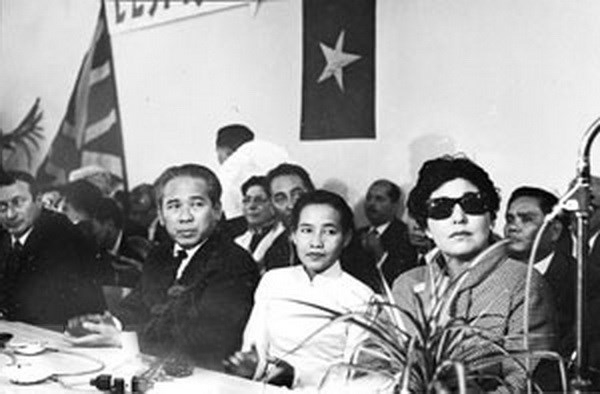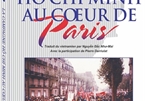 |
| Journalist Duong Thi Duyen (white dress) in a rally meeting of French people supporting the negotiating stance of the Vietnamese delegation at the Paris Conference, in 1968. VNA File Photo |
Duyen lived through the most dangerous but glorious times of Vietnam’s resistance wars against foreign invasion. Prominently she served from 1968 to 1970 as a VNA correspondent and member of the Democratic Republic of Vietnam’s delegation to the historic Paris conference on ending the war and restoring peace in Vietnam.
The ninety-one-year-old pulled out a range of mementos, including documents, photos, and other items, from her younger days, when she and many of her friends were devoted to the nation's revolutionary movement.
The passing of time has left its trace on her face and hands but her mind remains sharp when remembering days long gone, especially her years during the wars.
“My health may have declined but my memory of events I witnessed and my time with VNA is clear,” she said.
She was born in 1929 into an intellectual family in Hanoi with a long tradition of patriotism. Her father was professor of history Duong Quang Ham, the first principal of the prestigious Chu Van An High School, who died for the national cause in the first days of the war of resistance against the French in late 1946.
Duyen posted excellent academic results during her studies at the Dong Khanh girls' school, now the Trung Vuong High School in downtown Hanoi.
She and her friends were involved in a host of charitable work in their teens, including collecting rice for the poor during the harsh years between 1943 and 1945.
The image of her visiting homes in the city to solicit rice for the needy caught the eye of some men from the underground Viet Minh (the League for Vietnam Independence) movement, who sparked her first revolutionary beliefs.
Duyen became active in supporting the Viet Minh, undertaking different tasks such as printing secret documents, making contacts, and couriering letters and documents for the revolutionaries.
Such duties instilled in her the meaning and ideals of the revolution.
Due to her loyalty and enthusiasm for the movement, the young Hanoian was trusted to take a leading post at the South Vietnam news desk of VNA during the early days of its establishment, by the late 1950s.
She also took other important work for the news agency during the war time.
Paris Conference
Duyen’s most unforgettable memory is the time she joined the Vietnamese delegation to prepare for the Paris Conference, which took place following a national 1968 plan to establish a diplomatic front.
A 37-member delegation was recruited to attend the first round of talks, known under the code name Doan 37 (Delegation 37).
Duyen said the pioneering group to France took on all preparatory work for the opening of the conference.
In May 1968, when they arrived in Paris, it was all so strange that even finding appropriate accommodation was problematic, she recalled.
The delegation had to stay in a somewhat low-cost hotel to save on costs and she remembered how difficult it was to find a way to avoid the hounding foreign media, who were also in Paris.
“The negotiations were a major focus of global attention,” she said. “Even when working in a hotel room, delegates had to communicate by written words as they feared others were bugging.”
Fortunately, the French Communist Party later offered accommodation to the Vietnamese contingent and the group then had a more undemanding stay during the conference.
Duyen successfully completed two tasks in Paris: as a correspondent regularly sending news to VNA in Hanoi, and as a member of the diplomatic team who made substantial contributions to the success of Delegation 37.
Thanks to her good French, she was also assigned to take part in publicity efforts and to welcome guests, in particular women researchers from different localities in France and elsewhere who wanted to hear more about the conference and the war in Vietnam.
She travelled to many places throughout France and neighbouring countries such as Italy, Belgium, Sweden, and Germany, during which she collected reams of precious information on people’s movements supporting Vietnam that she could use when penning articles for VNA.
“Many American intellectuals and journalists visiting the headquarters of the Vietnamese delegation were critical of the US presence in Vietnam,” she remembered. “We welcomed them with an open mind, and gave them a solid grounding on many matters they neither knew nor understood.”
“The Vietnamese delegation in Paris revealed the Vietnamese to be a progressive, democratic, and peaceful people.”
She returned home in 1970 and continued to work at VNA for six more years, until she moved to the Vietnam Women’s Union in 1976 as head of the department for international relations.
Though she had left VNA, Duyen continued filing articles as a contributor.
Her eyes light up when she remembers different episodes in her life, especially her time in France.
Former VNA General Director Ho Tien Nghi spoke highly of Duyen’s contribution to revolutionary journalism in Vietnam.
“She is truly an outstanding journalist who is also brave and a clever diplomat,” Nghi said.
“I began working for VNA in the early 1960s and was directly trained by Duyen. I found she not only possessed exceptional expertise and political sensitivity, but was also a helpful mentor.” VNS
Nguyen Cuc

VN's book on diplomatic wins in the 1975 Spring Offensive released in French
The Gioi Publishing House has recently released a book in French, featuring memoirs of Vo Van Sung, a former Vietnamese ambassador in France, and images of Paris during Vietnam’s struggle for the reunification of the country in 1975.
 17 Phan Dinh Phung Street in Hanoi’s Ba Dinh District would be just a normal address were it not also the home of Duong Thi Duyen, a former journalist with the Vietnam News Agency (VNA).
17 Phan Dinh Phung Street in Hanoi’s Ba Dinh District would be just a normal address were it not also the home of Duong Thi Duyen, a former journalist with the Vietnam News Agency (VNA).